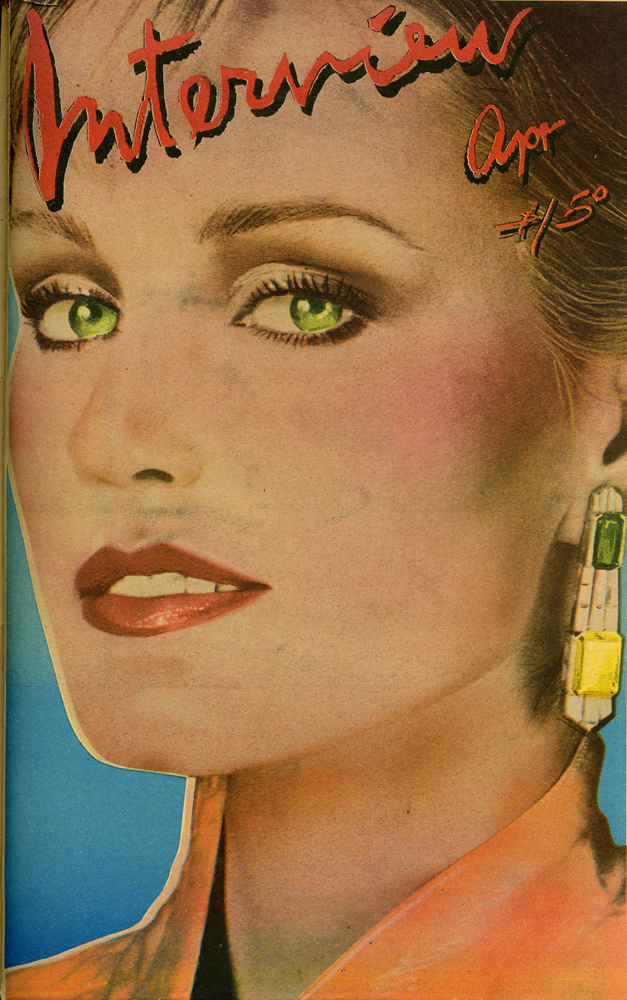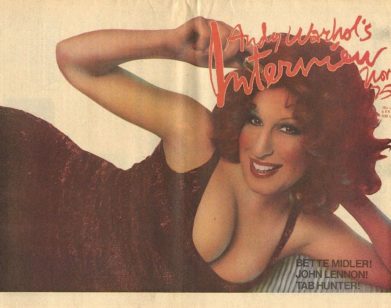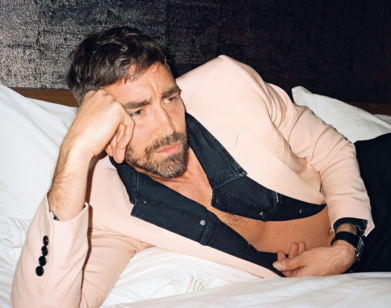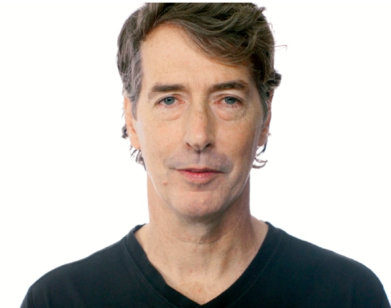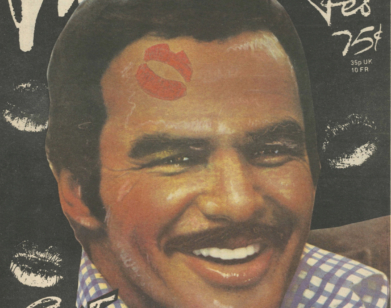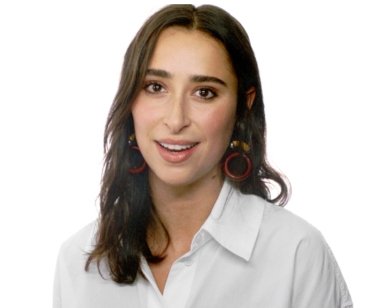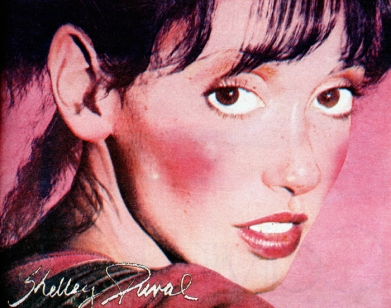Jessica Lange, Queen Kong, and ‘All That Jazz’
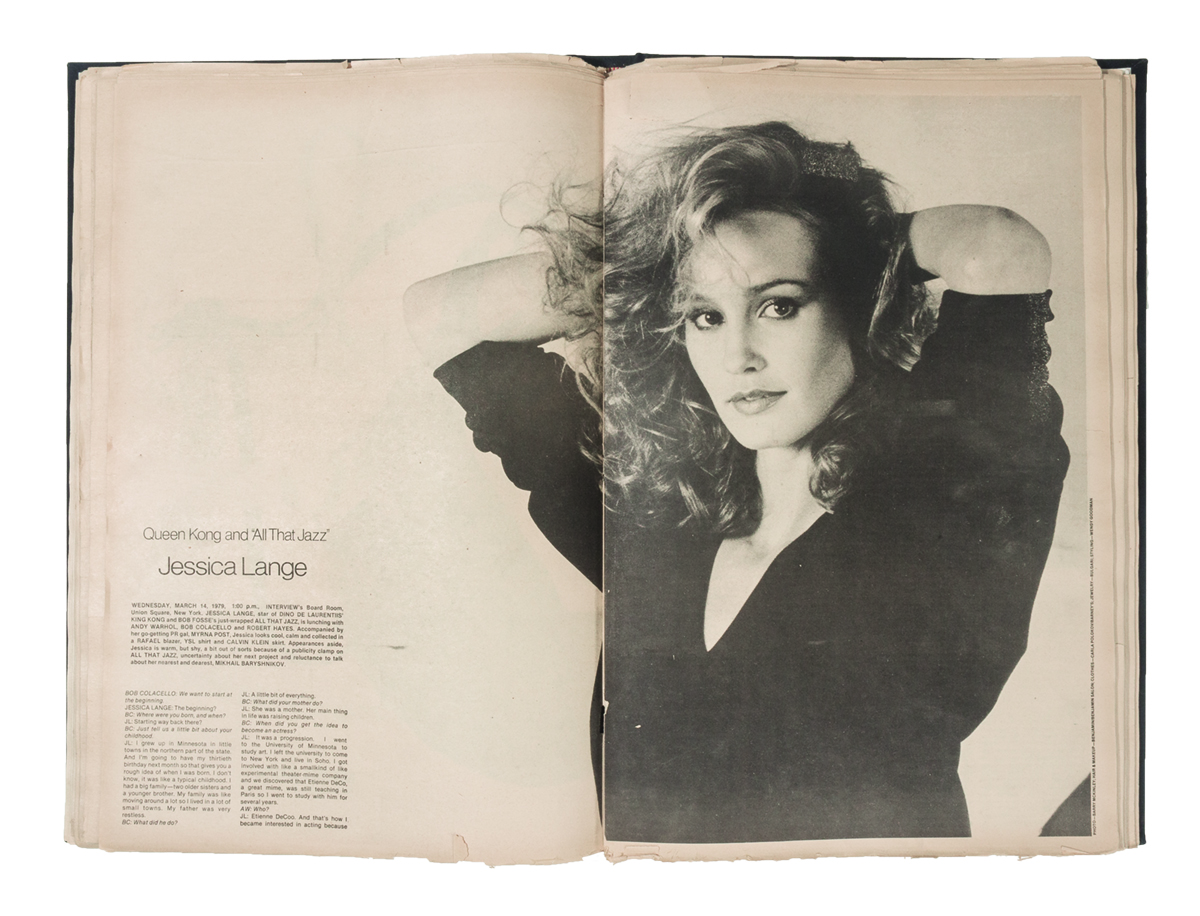
This story is part of a collection celebrating the best—and wildest—Warhol conversations from the Interview archives.
Wednesday, March 14, 1979, 1:00 p.m., Interview’s Board Room, Union Square, New York. Jessica Lange, star of Dino De Laurentiis’s King Kong and Bob Fosse’s just-wrapped All That Jazz, is lunching with Andy Warhol, Bob Colacello and Robert Hayes. Accompanied by her go-getting PR gal, Myrna Post, Jessica looks cool, calm and collected in a Rafael Blazer, YSL shirt and Calvin Klein skirt. Appearances aside, Jessica is warm, but shy, a bit out of sorts because of a publicity clamp on All That Jazz, uncertainty about her next project and reluctance to talk about her nearest and dearest, Mikhail Baryshnikov.
———
BOB COLACELLO: We want to start at the beginning.
JESSICA LANGE: The beginning?
COLACELLO: Where were you born, and when?
LANGE: Starting way back there?
COLACELLO: Just tell us a little bit about your childhood.
LANGE: I grew up in Minnesota in little towns in the northern part of the state. And I’m going to have my 30th birthday next month so that gives you a rough idea of when I was born. I don’t know, it was like a typical childhood. I had a big family—two older sisters and a younger brother. My family was like moving around a lot so I lived in a lot of small towns. My father was very restless.
COLACELLO: What did he do?
LANGE: A little bit of everything.
COLACELLO: What did your mother do?
LANGE: She was a mother. Her main thing in life was raising children.
COLACELLO: When did you get the idea to become an actress?
LANGE: It was a progression. I went to the University of Minnesota to study art. I left the university to come to New York and live in Soho. I got involved with like a small kind of like experimental theater-mime company and we discovered that Étienne Decroux, a great mime, was still teaching in Paris so I went to study with him for several years.
ANDY WARHOL: Who?
LANGE: Étienne Decroux. And that’s how I became interested in acting because there were a lot of actors in school who had come just to study mime for a little while and to get like a different kind of physical technique.
COLACELLO: I could get into mime.
LANGE: But this man’s mime was very different from anything you’ve ever seen.
COLACELLO: That’s what they all say.
LANGE: For instance, it doesn’t resemble [Marcel] Marceau’s technique at all. This man was a genius.
COLACELLO: When did you start modeling?
LANGE: I ran into Antonio [Lopez, the artist] in Paris. He’s discovered so many blondes. He suggested to me that maybe I should try modeling, just to make some money. So he introduced me to some people and I did it, not very seriously but I did a little bit.
WARHOL: It would be great to just do underwear ads when you get two thousand dollars an hour.
LANGE: I don’t really want to model too much anymore.
ROBERT HAYES: How long did you model anyway?
LANGE: I did it for about a year but I never really made that much money so I was working as a waitress for a while in the Village at The Lion’s Head. It had a lot of characters because it was like a writer’s bar.
COLACELLO: What was the first performance you actually did, the first professional thing?
LANGE: I worked at the Opera Clinique for a year. That was really the first stage experience I had except for like school plays.
WARHOL: Is that connected with Estée Lauder?
LANGE: No. But the first like professional thing I ever did was in Paris at the Opera. And then when I came back to New York I wanted to like do it real slowly. I wanted to study and then start auditioning for Off-Broadway, you know, experimental theater things. And the first thing that came up was this chance to go to Los Angeles and do a test with the commercial division at Wilhelmina and I had done like one or two commercials for them and De Laurentiis called.
COLACELLO: How did that affect your life? Because you got so much publicity and you were suddenly a big star.
LANGE: It happened so fast, like over night. They called me in the evening and said could I fly to Los Angeles in the morning to test. I said sure. Because I figured if nothing else it was like a trip to L.A. and I’d never been there before and it was a chance to do a screen test. I was never thinking past the moment. I did the screen test and I got the part. I started shooting the next week and then it was eleven months shooting and another two or three months of publicity tours. There was never a screen test for King Kong. It happened much faster than I had expected it and in a completely different way than I had expected to do it.
COLACELLO: How did that happen?
LANGE: That was really strange because there wasn’t a moment during that time I could really sit down and like think this what was happening, what was changing in my life, how it was going to be different after this. When I finished there was that immediate letdown when you’ve been really involved in a project and then suddenly one day it’s over. I know it happened again this weekend when I finished All That Jazz—that same kind of letdown because you’re used to maintaining such a high energy level for such a long period of time and then when it’s over you feel like there’s such a loss.
WARHOL: But you were going to work on so many other movies with De Laurentiis.
LANGE: But the funny thing was that he wasn’t doing anything right after Kong. There was a long period of time when there were no productions going…
COLACELLO: So you’re not under contract to De Laurentiis anymore?
LANGE: No. As of October the contract was terminated. I had to get out of the contract to do All That Jazz with Bob Fosse.
COLACELLO: And All That Jazz is finished already?
LANGE: We finished on Friday.
COLACELLO: How long were you working on it?
LANGE: They’ve been shooting since October and I was working off and on for the last month.
COLACELLO: How is Bob Fosse? Is he feeling okay?
LANGE: He’s feeling fine.
WARHOL: Bob was telling me that he had a heart attack and that he’s not supposed to work so hard and with the movie he’s working really hard.
LANGE: He always works hard.
WARHOL: And the movie’s about a director who has a heart attack or something. Isn’t that what it’s about?
LANGE: The thing is that I can’t talk much about the film because they’ve sown everybody to secrecy.
WARHOL: I know, I just read that in the paper then Bob knew. How did you know?
COLACELLO: How did I know? It was in Liz Smith’s column months ago. That’s how I know everything.
LANGE: It was really wonderful working with him.
COLACELLO: Do you dance in the movie?
LANGE: No. It’s a very, very—I don’t know how to describe it—just a dramatic role. I do no singing or dancing but it’s a musical. I mean, there are a lot of big musical numbers, but I don’t do any of it.
COLACELLO: Was it a lot harder to do than King Kong as an acting job?
LANGE: I felt it was, but they’re not really comparable. What I had to do in All That Jazz was really dealing with absolutely precision all the time and it was so condensed when I was working that it seemed like I was working twice as hard than I had ever worked before. But when I think back on Kong, that was like difficult too, because there was no reality in making that movie. There was so much that was left to my own devices and imagination. And when I had to play a scene opposite a 45-foot ape, that was bit taxing on your imagination because obviously there was nothing there, you know.
COLACELLO: What’s your typical day like? Do you get up and walk the dogs?
LANGE: They dictate my entire day. I get up in the morning and take them out, and then it depends—if I’m shooting then I just go to the studio. If I’m not shooting I’ll take a class or at least go and exercise.
HAYES: What kind of exercise do you do?
LANGE: I take a jazz class and I also take just a regular exercise class with a man who gives me acupressure treatments. It’s just stretching and elongating the muscles.
COLACELLO: Is that like acupuncture?
LANGE: It’s the same principle as acupuncture but it’s done with just the pressure of the thumbs, the pressure of the fingers. But it’s done just to release tension.
WARHOL: Dr. Giller has great thumbs.
COLACELLO: What do you and Baryshnikov do together? Dance or…
LANGE: …
WARHOL: He’s terrific.
LANGE: He’s a nice person.
WARHOL: He’s so interesting. I mean, he knows everything about furniture and painting and art.
LANGE: He’s very intelligent.
WARHOL: He really is. I saw him on 60 Minutes.
LANGE: Wasn’t that nice?
WARHOL: It was so beautiful.
LANGE: It was so touching.
WARHOL: It really was. Did you see him on 60 Minutes, Bob?
COLACELLO: No. Besides terrific, nice, interesting and intelligent what’s he like?
LANGE: …
WARHOL: He gave a great interview. He said when he wanted to act it came out all wrong but when he was just natural it was great. But he thought he should act. That’s the funny thing about acting and being natural. I guess when you’re natural you are acting just because you’re being filmed.
LANGE: At certain times you really feel as though you have to do something.
WARHOL: But you don’t.
LANGE: You don’t. But you see that’s the problem…
WARHOL: Because acting is knowing when you don’t do it.
LANGE: But that’s the problem with a lot of acting teachers and a lot of schools because they have that horrendous thing of like trying to teach you to act and it’s really not that.
COLACELLO: How did you get the part in All That Jazz?
LANGE: I met Bobby a couple of years ago and I think he kind of had me in mind for that part for a long time and when it was finally written we just sat down and read it together and he gave me ideas and we talked about it and he offered me the role. I like him a lot and he’s wonderful to work for. He’s very supportive of actors. I learned a lot from him.
WARHOL: Are you going to take a vacation now that the movie’s over?
LANGE: I’m going to go to my house in Wisconsin and I don’t know. I would like to go someplace warm. Actually, I would like to go to a spa and just be pampered for a week. Be massaged and facialed and…
WARHOL: That sounds nice.
LANGE: Ideally I’d like to go to someplace like Baden-Baden where you just go and spend the week and they exercise you in the morning and feed you and they get you to sleep like eight or ten hours a night.
WARHOL: Why don’t you just get some guy to do it for you at home?
LANGE: …
COLACELLO: Would you work for television?
LANGE: Yeah. Because every once in a while you see something very good on television. There’s one project I want to do so badly, I can’t tell you. In fact, last year I tried to get the rights to the book and it was owned by somebody already and I met with the people and talked to them and they said that they were working on the script and it was now being developed and sooner or later they were going to do a TV movie of the week. I don’t know if you remember the actress Frances Farmer? Her story is just incredible.
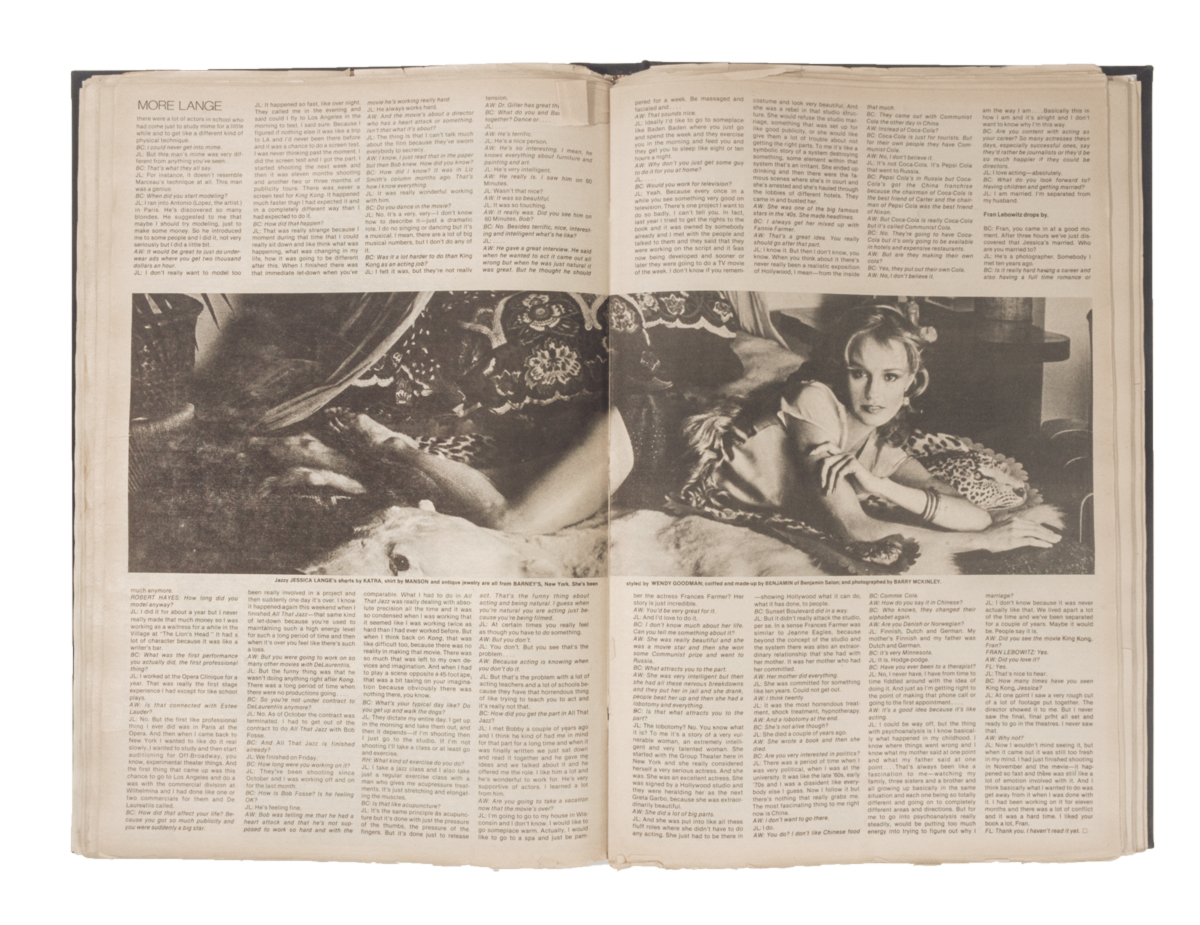
WARHOL: You’d be very great for it.
LANGE: And I’d love to do it.
COLACELLO: I don’t know much about her life. Can you tell me something about it?
WARHOL: She was really beautiful and she was a movie star and then she won some Communist prize and went to Russia.
COLACELLO: What attracts you to the part?
WARHOL: She was very intelligent but then she had all these nervous breakdowns and they put her in jail and she drank, people beat her up and then she had a lobotomy and everything.
COLACELLO: Is that what attracts you to the part?
LANGE: The lobotomy? No. You know what it is? To me it’s a story of a very vulnerable woman, an extremely intelligent and very talented woman. She started with the Group Theater here in New York and she really considered herself a very serious actress. And she was. She was an excellent actress. She was signed by a Hollywood studio and they were heralding her as the next Greta Garbo, because she was extraordinarily beautiful.
WARHOL: She did a lot of big parts.
LANGE: And she was put into like all these fluff roles where she didn’t have to do any acting. She just had to be there in costume and look very beautiful. And she was a rebel in that studio structure. She would refuse the studio marriage, something that was set up for like good publicity, or she would like give them a lot of trouble about not getting the right parts. To me it’s like a symbolic story of a system destroying something, some element within that system that’s an irritant. She ended up drinking and then there were the famous scenes where she’s in court and she’s arrested and she’s hauled through the lobbies of different hotels. They came in and busted her.
WARHOL: She was one of the big famous stars in the ’40s. She made headlines.
COLACELLO: I always get her mixed up with Fannie Farmer.
WARHOL: That’s a great idea. You really should go after that part.
LANGE: I know it. But then I don’t know, you know. When you think about it there’s never really been a realistic exposition of Hollywood, I mean—from the inside—showing Hollywood what it can do, what it has done, to people.
COLACELLO: Sunset Boulevard did in a way.
LANGE: But it didn’t really attack the studio, per se. In a sense Frances Farmer was similar to Jeanne Eagels, because beyond the concept of the studio and the system there was also an extraordinary relationship that she had with her mother. It was her mother who had her committed.
WARHOL: Her mother did everything.
LANGE: She was committed for something like ten years. Could not get out.
WARHOL: I think twenty.
LANGE: It was the most horrendous treatment, shock treatment, hypnotherapy.
WARHOL: And a lobotomy at the end.
COLACELLO: She’s not alive though?
LANGE: She died a couple of years ago.
WARHOL: She wrote a book and then she died.
COLACELLO: Are you very interested in politics?
LANGE: There was a period of time when I was very political, when I was at the university. It was like the late ’60s, early ’70s and I was a dissident like everybody else I guess. Now I follow it but there’s nothing that really grabs me. The most fascinating thing to me right now is China.
WARHOL: I don’t want to go there.
LANGE: I do.
WARHOL: You do? I don’t like Chinese food that much.
COLACELLO: They came out with Communist Cola the other day in China.
WARHOL: Instead of Coca-Cola?
COLACELLO: Coca-Cola is just for tourists. But for their own people they have Communist Cola.
WARHOL: No, I don’t believe it.
LANGE: It’s not Coca-Cola. It’s Pepsi Cola that went to Russia.
COLACELLO: Pepsi Cola’s in Russia but Coca-Cola’s got the China franchise because the chairman of Coca-Cola is the best friend of Carter and the chairman of Pepsi Cola was the best friend of Nixon.
WARHOL: But Coca-Cola is really Coca-Cola but it’s called Communist Cola.
COLACELLO: No. They’re going to have Coca-Cola but it’s only going to be available in hotels and expensive restaurants.
WARHOL: But are they making their own cola?
COLACELLO: Yes, they put out their own Cola.
WARHOL: No, I don’t believe it.
COLACELLO: Commie Cola.
WARHOL: How do you say it in Chinese?
COLACELLO: Who knows, they changed their alphabet again.
WARHOL: Are you Danish or Norwegian?
LANGE: Finnish, Dutch and German. My mother’s Finnish and my father was Dutch and German.
COLACELLO: It’s very Minnesota.
LANGE: It is. Hodgepodge.
COLACELLO: Have you ever been to a therapist.
LANGE: No, I never have. I have from time to time fiddled around with the idea of doing it. And just as I’m getting right to the point of making that phone call or going to the first appointment…
WARHOL: It’s a good idea because it’s like acting.
LANGE: I could be way off, but the thing with psychoanalysis is I know basically what happened in my childhood. I know where things went wrong and I know what my mother said at one point and what my father said at one point… That’s always been like a fascination to me—watching my family, three sisters and a brother and all growing up basically in the same situation and each one being so totally different and going on to completely different areas and directions. But for me to go into psychoanalysis really steadily, would be putting too much energy into trying to figure out why I am the way I am… Basically this is how I am and it’s alright and I don’t want to know why I’m this way.
COLACELLO: Are you content with acting as your career? So many actresses these days, especially successful ones, say they’d rather be journalists or they’d be so much happier if they could be directors.
LANGE: I love acting—absolutely.
COLACELLO: What do you look forward to? Having children and getting married?
LANGE: I am married. I’m separated from my husband.
[Fran Lebowitz drops by.]
COLACELLO: Fran, you came in at a good moment. After three hours we’ve just discovered that Jessica’s married. Who are you married to?
LANGE: He’s a photographer. Somebody I met ten years ago.
COLACELLO: Is it really hard having a career and also having a full time romance or marriage?
LANGE: I don’t know because it was never actually like that. We lived apart a lot of the time and we’ve been separated for a couple of years. Maybe it would be. People say it is.
WARHOL: Did you see the movie King Kong, Fran?
FRAN LEBOWITZ: Yes.
WARHOL: Did you love it?
LEBOWITZ: Yes.
LANGE: That’s nice to hear.
COLACELLO: How many times have you seen King Kong, Jessica?
LANGE: At one point I saw a very rough cut of a lot of footage put together. The director showed it to me. But I never saw the final, final print all set and ready to go in the theatres. I never saw that.
WARHOL: Why not?
LANGE: Now I wouldn’t mind seeing it, but when it came out it was still too fresh in my mind. I had just finished shooting in November and the movie—it happened so fast and there was still like a lot of emotion involved with it. And I think basically what I wanted to do was get away from it when I was done with it. I had been working on it for eleven months and there was a lot of conflict and it was a hard time. I like your book a lot, Fran.
LEBOWITZ: Thank you. I haven’t read it yet.
THIS INTERVIEW ORIGINALLY RAN IN THE APRIL 1979 ISSUE OF INTERVIEW.
——–
Read more stories from the Celebrating Warhol collection.

